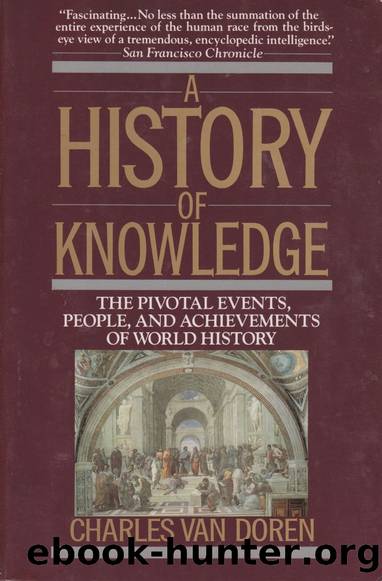A History of Knowledge: The Pivotal Events, People, and Achievements of World History by Charles Van Doren

Author:Charles Van Doren [Doren, Charles Van]
Language: eng
Format: epub
ISBN: 9780345373168
Barnesnoble:
Goodreads: 761162
Published: 2006-05-21T08:30:51+00:00
204
A H ISTORY OF KNOWLEDGE
certainty with which he desired to know everything. Or rather, he knew nothing with that certainty except some mathematical truths.
In mathematics, he felt, it was possible to know things, for you started from axioms that possessed the character of indubitable certainty, and built from there, by small steps, a structure that possessed the same character. Such certainty adhered to nothing else, he thought, not to any other science, not to history, not to philosophy, not even to theology, despite the claim of the last to the highest certainty available to manâs mind.
By 1 639, after wide travels, much reading, and a voluminous correspondence with the most progressive thinkers of Europe, Descartes was ready to write a kind of summa of his philosophy which would organize all knowledge into one great structure, based on a universal method that led to certainty. But in that year he learned ofGalileoâs condemnation, and he decided he had better not write that book. Instead, he wrote The Discourse on Method, which concentrated on the method only, and left to others the work of applying it to discover controversial new truths. Nevertheless, even the Discourse got Descartes into serious trouble.
It is an absolutely astonishing book. In it, in French that exemplified the clarity and distinctness of the authorâs thought, he recounted the history of his intellectual development, how he began to doubt whether what he had been taught was true, and continued to doubt until he arrived at the simple conclusion that all might be doubted except one thing, namely, that he, the doubter, existed because he doubted. (Dubito ergo sum. âl doubt; therefore I am.â) He then proceeded to discover a method of achieving similar certainty in other realms, based on the reduction of all problems to a mathematical form and solution. Thereupon he proved the existence of God mathematically and at the same time showed how God had created a world that would run forever without his assistance, like a huge, complex, and ornate clock. And he managed to do all of this in twenty-five pages. An amazing performance.
The method itself was the important thing. To understand some phenomenon or set of phenomena, first rid your mind of all preconceptions.
This is not easy, and Descartes was not always successful in doing it.
Second, reduce the problem to mathematical form, and then employ the minimum number of axioms, or self-evident propositions, to shape it.
Then, using analytic geometry, which Descartes invented for the purpose, further reduce the description of the phenomena to a set of numbers.
Finally, applying the rules of algebra, solve the equations that result, and you will have the certain knowledge that you seek.
Galileo had said that the Book of Nature is written in mathematical characters. Descartes showed that these mathematical characters are simply numbers, for to every real point there can be attached a set of
Download
This site does not store any files on its server. We only index and link to content provided by other sites. Please contact the content providers to delete copyright contents if any and email us, we'll remove relevant links or contents immediately.
Periodization Training for Sports by Tudor Bompa(8254)
The Body: A Guide for Occupants by Bill Bryson(5082)
The MacArthur Bible Commentary by John MacArthur(4823)
The Sports Rules Book by Human Kinetics(4379)
What It Really Takes to Get Into Ivy League and Other Highly Selective Colleges by Hughes Chuck(3752)
Marijuana Grower's Handbook by Ed Rosenthal(3677)
The Sprouting Book by Ann Wigmore(3587)
The Martian by Andy Weir(3418)
Salt, Fat, Acid, Heat: Mastering the Elements of Good Cooking by Nosrat Samin(3146)
Sapiens and Homo Deus by Yuval Noah Harari(3068)
The Bread Bible by Rose Levy Beranbaum(3066)
Harry Potter 4 - Harry Potter and The Goblet of Fire by J.K.Rowling(3061)
The Marketing Plan Handbook: Develop Big-Picture Marketing Plans for Pennies on the Dollar by Robert W. Bly(3057)
Classic by Mary Berry(3011)
Martha Stewart's Baking Handbook by Martha Stewart(2854)
Screenplay: The Foundations of Screenwriting by Syd Field(2637)
The Plant Paradox by Dr. Steven R. Gundry M.D(2611)
50 Economics Classics by Tom Butler-Bowdon(2568)
The Cambridge Grammar Of The English Language by Rodney Huddleston Geoffrey K. Pullum(2429)
